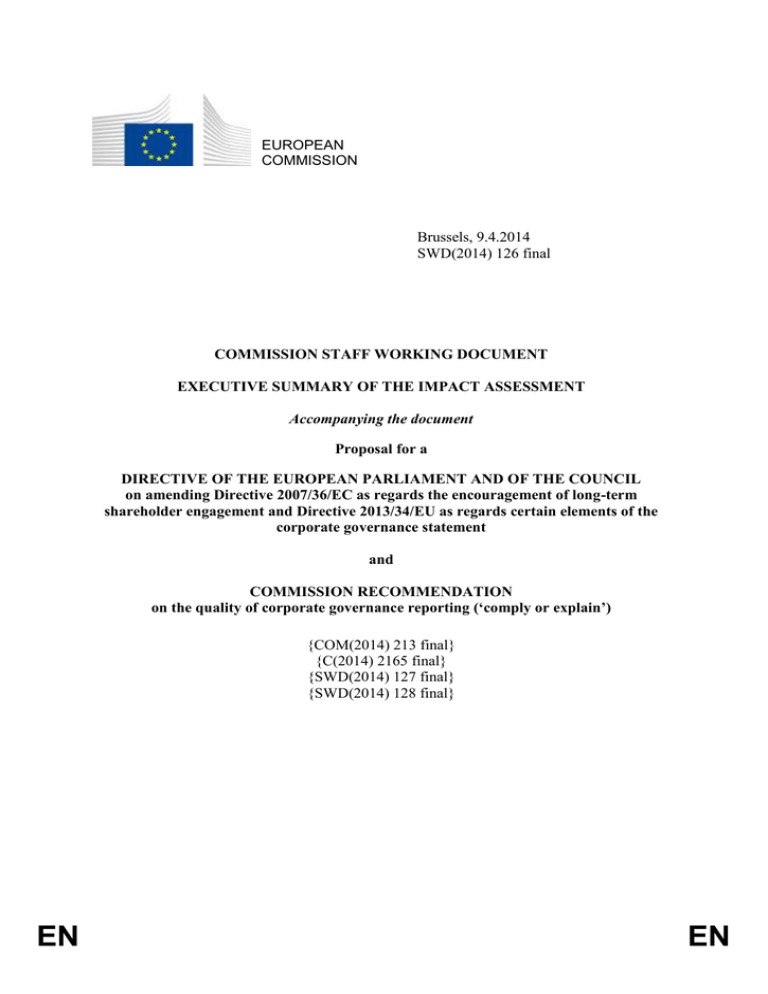Document 10469693
advertisement

EUROPEAN
COMMISSION
Brussels, 9.4.2014
SWD(2014) 126 final
COMMISSION STAFF WORKING DOCUMENT
EXECUTIVE SUMMARY OF THE IMPACT ASSESSMENT
Accompanying the document
Proposal for a
DIRECTIVE OF THE EUROPEAN PARLIAMENT AND OF THE COUNCIL
on amending Directive 2007/36/EC as regards the encouragement of long-term
shareholder engagement and Directive 2013/34/EU as regards certain elements of the
corporate governance statement
and
COMMISSION RECOMMENDATION
on the quality of corporate governance reporting (‘comply or explain’)
{COM(2014) 213 final}
{C(2014) 2165 final}
{SWD(2014) 127 final}
{SWD(2014) 128 final}
EN
EN
1.
INTRODUCTION
The past years have highlighted certain corporate governance shortcomings of European listed
companies. These shortcomings relate to different corporate governance actors: directors,
shareholders (institutional investors and asset managers) and proxy advisors.
Only a number of key aspects of corporate governance have been harmonised at EU level, in
particular through Directive 2007/36/EC on the exercise of certain rights of shareholders in
listed companies. This Directive contains rules on the participation in general meetings. The
need to enhance the current framework has been highlighted in the Commission Action Plan
on European company law and corporate governance.1 This impact assessment considers
possible ways to achieve the objectives of the Action Plan.
2.
PROBLEM DEFINITION
This impact assessment analyses a number of problems in the area of corporate governance.
One of the key issues in corporate governance is the separation between ownership and
control and the resulting principal-agent relationship between shareholders and directors. The
delegation of management of the company by shareholders (“principals”) to directors
(“agents”) leaves room for directors to act more in their own self-interest than in the interest
of the shareholders. This could lead to suboptimal corporate governance and performance of
companies. Today, institutional investors and asset managers are an important force in equity
markets and intermediation within the investment chain (delegation of the day-to-day
management of the investment to asset managers) has increased substantially. Increased
intermediation has led to the emergence of incentives within the investment chain that often
focus on short-term performance and do not sufficiently exploit the benefits of shareholder
engagement. Institutional investors and asset managers are therefore often absent and do not
take an interest in the governance of companies. This exacerbates the agency problem
between shareholders and company directors and leads to suboptimal performance of listed
companies. Studies demonstrate that long-term shareholder engagement not only leads to
better performance of investors but contributes also to enhancing the competitiveness and
performance of companies.
2.1.
Insufficient engagement of institutional investors and asset managers
The financial crisis has revealed that shareholder control did not function properly in the
financial sector. Rather than containing excessive short-term risk taking by managers,
shareholders, in many cases, supported it. Listed companies in general do not have markedly
different shareholders than financial institutions and there is clear evidence that the current
level of “monitoring” of investee companies and engagement by institutional investors and
asset managers is sub-optimal. Research demonstrates that institutional investors and their
asset managers do not sufficiently focus on the long-term performance of companies, but on
share-price movements and the structure of capital market indexes, which may not lead to an
optimal return for the end beneficiaries (for example future pensioners) and puts short-term
pressure on companies.
This short-termism appears to be rooted in a misalignment of interests between asset owners
and asset managers. Large asset owners, such as pension funds and insurers have long-term
1
COM/2012/0740 final
2
interests as their liabilities are long-term. However, for the selection and evaluation of asset
managers they often rely on benchmarks, such as market indexes, and the performance of the
asset manager is often evaluated on a quarterly basis. In case of underperformance, the asset
manager may lose the mandate. As a result many asset managers’ main concern has become
their short term performance relative to a benchmark or to other asset managers, although the
end beneficiaries have an interest in the long-term absolute performance of the investment.
Short-term incentives turn focus and resources away from making investments based on the
fundamentals and longer term perspectives, from increasing long-term value through
shareholder engagement and result in short-term pressure on companies creating disincentives
for competitiveness-enhancing investments. .
Albeit still relatively limited, there is a growing number of investors which aim to combine
financial outperformance with long-term value creation and their investment strategies also
involve engagement with investee companies.
2.2.
Insufficient link between pay and performance of directors
Shareholder oversight on directors’ remuneration has also shown to be insufficient. Directors’
remuneration plays a key role in aligning the interests of directors and shareholders and
ensuring that the directors act in the best interest of the company. Where shareholders do not
oversee directors’ pay, there is a risk that directors will apply a strategy which rewards them
personally, but that may not contribute to the long-term performance of the company. Several
shortcomings have been detected in the current framework. First, the information disclosed by
companies is not comprehensive, clear nor comparable. Secondly, shareholders often do not
have sufficient tools to express their opinion on directors’ remuneration.
2.3.
Lack of shareholder oversight on related party transactions
Related party transactions (RPTs), i.e. transactions between a company and its management,
directors, controlling entities or shareholders, create the opportunity to expropriate value
belonging to the company to the detriment of (minority) shareholders. In most cases
shareholders do not have access to sufficient information ahead of the planned transaction and
do not have adequate tools to oppose to abusive transactions. As institutional investors and
asset managers are in most cases minority shareholders, more control rights over RPTs would
improve their ability to protect their investments.
2.4.
Inadequate transparency of proxy advisors
Proxy advisors provide recommendations to investors on how to vote in general meetings of
listed companies. The large number of (cross-border) holdings by many institutional investors
and asset managers and the complexity of the issues to be considered make the use of proxy
advisors in many cases inevitable and thus proxy advisors have considerable influence on the
voting behaviour of these investors. In particular, shortcomings concerning the quality of
advice as well as conflicts of interest have been observed.
2.5.
Difficult and costly exercise of rights flowing from shares
Investors face difficulties in exercising the rights flowing from their shares, especially if these
are held cross-border. In intermediated holding chains, especially when they involve many
intermediaries administering securities accounts, information is not passed to shareholders
from companies or shareholders' votes get lost. There is also a greater likelihood of misuse of
3
the voting rights by intermediaries. Three main causes affect the systems: the lack of
possibility for the company to identify investors, a lack of timely transmission of information
and rights in the investment chain and price discriminations of cross-border holdings.
2.6.
Insufficient quality of corporate governance information
Shortcomings have been observed as regards the quality of corporate governance reports
prepared by listed companies in the EU, in particular as regards the explanations for
deviations from corporate governance codes’ recommendations. In over 60% of cases where
companies chose not to apply recommendations, they did not provide sufficient explanations.
Inappropriate reporting makes it more difficult for shareholders to take informed investment
decisions and engage with the company.
2.7
Subsidiarity
The competence for action is based on Article 50(2)(g) of the TFEU. The growing importance
of cross-border equity investments (some 44% of the total market capitalisation of EU listed
companies is held by foreign investors) and the changes in the equity investment chain justify
certain targeted measures at EU level in order to ensure the protection of the interests of
shareholders and other stakeholders. Only a limited number of Member States has undertaken
action or is considering doing so to tackle the problems, and these actions cannot bring
effective solutions to these problems. Action from Member States alone is likely to result in
different sets of rules creating an uneven level playing field, which may undermine or create
new obstacles to the good functioning of the internal market.
3.
POLICY OPTIONS, IMPACT ANALYSIS AND CHOICE OF PREFERRED OPTION
3.1.
Increase the level of engagement of institutional investors and asset managers
Policy options
1 No policy change
2 Recommendation on transparency of institutional investors and asset managers on their
voting and engagement and certain aspects of asset management mandates
3 Mandatory transparency of institutional investors and asset managers on their voting and
engagement and certain aspects of asset management mandates
4
Assessment of policy options
Effectiveness
Efficiency
Coherence
0
0
0
Option 2: recommendation on transparency of +
institutional investors and asset managers
+
+
Option 3: binding rules on transparency of ++
institutional investors and asset managers
+
+
Option 1: no policy change
Option 3 is the preferred option:
This option would increase transparency on how asset owners incentivise their asset managers
to act in the best long-term interest of their beneficiaries and to pursue investment strategies
involving shareholder engagement. Asset managers would be required to be transparent about
their engagement policies, the benefits of these and how they discharge their policies
mandated. Substantial and relevant information would enable asset owners to make better
informed decisions about their investment policies. It would stimulate them to engage more
with investee companies. Transparency on the costs of frequent portfolio turnover by asset
managers may reduce the magnitude of such transactions, contributing to a better focus on the
fundamental value of companies and increasing this value through shareholder engagement.
These measures may ultimately result in cost savings and better return for asset owners and
ultimate beneficiaries. A better focus on the fundamentals and the real value-creative capacity
of companies could in particular be beneficial for listed SMEs. More engagement and a
longer-term perspective could also contribute to higher investments by companies into
research and competitiveness and thus more employment.
Binding rules on transparency would provide the highest likelihood to trigger a positive
change with limited cost.
3.2.
Create a better link between pay and performance
Policy options
1 No policy change
2 Binding rules on transparency of remuneration
3 Shareholder vote on remuneration
5
Assessment of policy options
Effectiveness
Efficiency
Coherence
0
0
0
Option 2: binding rules on transparency of +
remuneration
+
+
Option
3:
remuneration
++
+
Option 1: no policy change
shareholder
vote
on +
Options 2 and 3 are the preferred options: Providing shareholders with clear,
comprehensive and comparable information on remuneration policies and individual
remuneration of directors would help them in exercising effective oversight. Harmonisation of
disclosure requirements at EU level would be a remedy to asymmetry of information and,
therefore, minimise agency costs. It would be beneficial for cross-border investment, since it
would facilitate comparison of information and make engagement easier and thus less costly.
Moreover, it would make companies more accountable to other stakeholders.
Granting shareholders a vote on pay would give them an effective tool to oversee directors’
remuneration and engage with companies while also strengthening the link between pay and
performance.
3.3.
Transparency and oversight on related party transactions
Policy options
1 No policy change
2 Soft-law providing guidance
3 Improving transparency requirements for related party transactions
4 Shareholder vote on the most important transactions
Assessment of policy options
Effectiveness
Efficiency
Coherence
Option 1: no policy change
0
0
0
Option 2: soft-law providing guidance
≈
≈
+
Option 3: improving transparency requirements +
for related party transactions
+
+
Option 4: shareholders vote on the most ++
important transactions
++
+
6
Options 3 and 4 are the preferred options: providing investors with ex ante information on
most important transactions would allow them (in particular minority shareholders) to act
against unjustified transactions and to engage more with the company, while the vote would
allow them to reject abusive transactions. A shareholder vote would also stimulate reflection
of companies on RPTs. This combination could have a positive impact on competiveness and
sustainability of companies and cross-border investment.
Binding rules are likely to be more effective than soft-law guidance.
3.4.
Transparency of proxy advisors
Policy options
1 No policy change
2 Recommendation on transparency on methodology and conflicts of interests
3 Binding disclosure requirements on methodology and conflicts of interests
4 Detailed regulatory framework
Assessment of policy options
Effectiveness
Efficiency
Coherence
Option 1: no policy change
0
0
0
Option 2: recommendation on transparency
≈
+
++
Option 3: binding rules on transparency
+
++
+
Option 4: detailed regulatory framework
++
-
-
Option 3 is the preferred option: requiring disclosure on the two main areas of concern
(methodology and management of potential conflicts of interest) would put additional
pressure on proxy advisors to establish adequate procedures on these crucial aspects. Binding
transparency requirements would be more effective than soft law, while avoiding inflexible
and disproportionate charges linked to a detailed regulatory framework.
3.5.
Shareholder identification and facilitation of the exercise of shareholder rights
by securities account providers
Policy options
1 No policy change
2 Minimum EU rules
3 Detailed requirements regarding the possibility of shareholder identification and obligations
for the facilitation of the exercise of shareholder rights by intermediaries
7
Assessment of policy options
Effectiveness
Efficiency
Coherence
Option 1: no policy 0
change
0
0
Option 2: minimum +
EU rules
++
+
Option
shareholder
identification
mechanism
obligations
intermediaries
++
+
3: ++
for
Option 3 is the preferred option: An obligation for intermediaries providing securities
accounts to offer the service of shareholder identification to the company will facilitate a
direct contact between the shareholder and the company. The obligation for these
intermediaries to transmit information related to the share, facilitate the exercise of
shareholder rights and justify price differences for these services if the rights are exercised
across the borders will ensure that shareholder votes do not get lost and shareholders are able
to engage more efficiently across the borders.
3.6.
Improving the quality of corporate governance reporting
Policy options
1 No policy change
2 Recommendation providing guidance
3 Detailed requirements regarding corporate governance reporting
Assessment of policy options
Effectiveness
Efficiency
Coherence
Option 1: no policy change
0
0
0
Option 2: recommendation providing guidelines
+
++
++
Option 3: detailed rules
++
+
+
Option 2 is the preferred option: Providing guidelines on the explanations for deviations
from codes is likely to give companies more certainty in preparing such reports and improve
their quality. It would incentivise them to reflect more thoroughly about their corporate
governance arrangements and improve them, if necessary, which could contribute to better
8
performance. It could also contribute to cross-border investment, due to increased
transparency and comparability of reports.
4.
OVERALL IMPACTS OF THE PACKAGE
The proposed approach constitutes a package of complementary actions. The package is part
of the Commission’s work on the long-term financing of the European economy: it
contributes to a more long-term perspective of shareholders which ensures better operating
conditions for listed companies.
The objective of the preferred options is to ensure that investors have clear, comprehensive
and comparable information at their disposal, which removes, in particular for cross-border
investors, barriers to engagement. Creating more transparency on the impact of the investment
policies will result in more informed decisions of investors and final beneficiaries, but will
also incentivise investors to become more engaged with their investee companies. Any
increase in shareholder engagement is likely to have a positive effect on both shareholder
value and the efficiency, competitiveness and performance of the target company.2
The proposed package could therefore positively impact the long-term sustainability of listed
companies, including SMEs, which are likely to benefit from a better access to capital
markets. Some positive social impacts could also be expected, since long-term oriented
companies could create more employment. No specific environmental impact is foreseen.
The package would result in an increase in administrative burden, including for listed SMEs.
However, these costs would be limited considering that mostly transparency and publication
measures are foreseen and that some degree of transparency is already imposed or applied on
voluntary basis. Additionally, costs will be distributed evenly between the different
stakeholder groups.
5.
EVALUATION
An evaluation of the impact of the package shall be carried out five years after the
transposition deadline, and the appropriateness of eventual amendments may be considered on
basis of the results of the evaluation.
2
Shareholder engagement on corporate governance, with remuneration being one of the key issues, may
generate an average of 7-8% abnormal cumulative and buy and hold stock return over a year, lower the
cost of capital for companies and significantly improve their governance and profitability.
9









